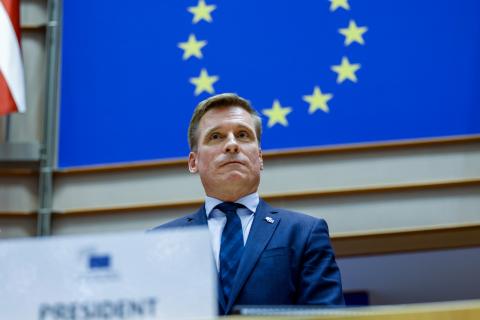European Economic
and Social Committee
Statement of the EESC President on the situation in the Middle East
As the President of the European Economic and Social Committee, I am deeply concerned by the escalation of violence in the Middle East. The EESC expresses its deepest solidarity with the affected populations and urges all actors involved to prioritise the protection of civilians and civilian critical infrastructure in line with international humanitarian law.
The EESC supports the European Union’s call for de-escalation, and call the United Nations and other international partners to deploy all possible diplomatic efforts to this end.
The EESC unequivocally condemns attacks on civilians and calls for an immediate cessation of hostilities.
One year after the Hamas’ brutal and indiscriminate terrorist attacks across Israel, we call for the immediate and safe release of hostages still held by Hamas. At the same time, the EESC is highly concerned about the growing humanitarian crisis in Gaza, where access to essential aid and services has been severely compromised and a lot civilians have been killed or severely injured. We are also concerned by the constantly increasing level of violence in the occupied West Bank, worsening socio-economic conditions and ongoing establishing of illegal settlements in the area.
The EESC is alarmed by the unprecedent levels of cross-border violence, including Hezbollah's ongoing attacks on Israel, as well as Israeli strikes on civilian areas in Lebanon. The disproportionate impact on civilians, especially women and children, is unacceptable.
The EESC stresses the importance of adhering to UN Resolution 1701, which mandates the cessation of hostilities between Hezbollah and Israel and calls for both parties to respect Lebanon's sovereignty.
We condemn the Iran’s attack against Israel, which constitutes a threat for the regional security. We call on all actors to avoid a calamitous full scale war in the region.
We remind that civil society organisations play a crucial role in promoting peace and rebuilding social cohesion. The EESC reiterates its commitment to empowering these actors and encourages the international community, including the EU, to step up diplomatic efforts in support of inclusive peacebuilding initiatives.
We firmly believe that lasting peace in the region can only be achieved through dialogue, respect for human rights, and the full implementation of international law. The EESC will continue to work alongside the EU institutions, civil society, and international partners to foster long-term peace and stability in the Middle East. As always, we stand ready to assist in efforts aimed at restoring peace and ensuring that human rights and international law are upheld across the region.
